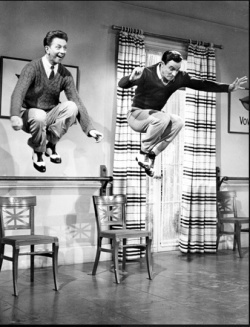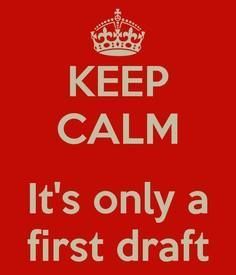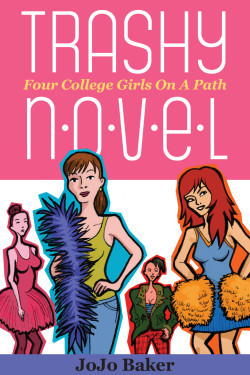Arlene Miller's Blog, page 60
December 26, 2014
Quotes for the Holiday Season

Happy New Year!
Since we deal with words over here at bigwords 101/The Grammar Diva, we thought you might like to read some words uttered by others about things we might think about during the holiday season: (Credit for the quotes goes to The Quote Garden website.)
On Alcohol:
I feel sorry for people who don’t drink. When they wake up in the morning, that’s as good as they’re going to feel all day. ~Frank Sinatra
I drink only to make my friends seem interesting. ~Don Marquis
On Blessings:
May all your troubles last as long as your New Year’s resolutions. ~Joey Adams
May you live as long as you want,
And never want as long as you live.
~Irish Blessing
On Childhood:
When you finally go back to your old hometown, you find it wasn’t the old home you missed but your childhood. ~Sam Ewing
Childhood is that wonderful time of life when all you need to do to lose weight is take a bath. ~Author Unknown
On Consumerism:
Oh, for the good old days when people would stop Christmas shopping when they ran out of money. ~Author Unknown
Stuffocation: being overwhelmed by the stuff one has bought or accumulated. ~Author Unknown
On December:
Christmas begins about the first of December with an office party and ends when you finally realize what you spent, around April fifteenth of the next year. ~P.J. O’Rourke, Modern Manners: An Etiquette Book for Rude People, 1983
How did it get so late so soon?
It’s night before it’s afternoon.
December is here before it’s June.
My goodness how the time has flewn.
How did it get so late so soon?
~Dr. Seuss
On Desserts:
Research tells us fourteen out of any ten individuals likes chocolate. ~Sandra Boynton
Always serve too much hot fudge sauce on hot fudge sundaes. It makes people overjoyed, and puts them in your debt. ~Judith Olney
On Dieting:
The cardiologist’s diet: If it tastes good, spit it out. ~Author Unknown
I go up and down the scale so often that if they ever perform an autopsy on me they’ll find me like a strip of bacon — a streak of lean and a streak of fat. ~Texas Guinan
On Family:
It is not flesh and blood but the heart which makes us fathers and sons. ~Johann Schiller
Families are like fudge — mostly sweet with a few nuts. ~Author Unknown
On Food:
One of the very nicest things about life is the way we must regularly stop whatever it is we are doing and devote our attention to eating. ~Luciano Pavarotti and William Wright, Pavarotti, My Own Story
The most remarkable thing about my mother is that for thirty years she served the family nothing but leftovers. The original meal has never been found. ~Calvin Trillin
On Generations:
They say genes skip generations. Maybe that’s why grandparents find their grandchildren so likeable. ~Joan McIntosh
First we are children to our parents, then parents to our children, then parents to our parents, then children to our children. ~Milton Greenblatt
On Gifts:
It isn’t the size of the gift that matters, but the size of the heart that gives it. ~Quoted in The Angels’ Little Instruction Book by Eileen Elias Freeman, 1994
Christmas is the season when you buy this year’s gifts with next year’s money. ~Author Unknown
On Guests:
Santa Claus has the right idea: Visit people once a year. ~Victor Borge
If you are a host to your guest, be a host to his dog also. ~Russian Proverb
On Housework:
Housework is something you do that nobody notices until you don’t do it. ~Author Unknown
There may be dust in my house but there isn’t any on me. ~Author Unknown
On Parties:
At every party there are two kinds of people — those who want to go home and those who don’t. The trouble is, they are usually married to each other. ~Ann Landers
I am thankful for the mess to clean after a party because it means I have been surrounded by friends. ~Nancie J. Carmody
On Peace:
You cannot shake hands with a clenched fist. ~Golda Meir
Peace cannot be achieved through violence, it can only be attained through understanding. ~Ralph Waldo Emerson
On Shopping:
People will buy anything that is one to a customer. ~Sinclair Lewis
Shopping is better than sex. If you’re not satisfied after shopping you can make an exchange for something you really like. ~Adrienne Gusoff
On Social Anxiety:
Nobody realizes that some people expend tremendous energy merely to be normal. ~Albert Camus
I love mankind — it’s people I can’t stand. ~Charles M. Schulz, Go Fly a Kite, Charlie Brown #INFJ
On Christmas:
He who has not Christmas in his heart will never find it under a tree. ~Roy L. Smith
The best of all gifts around any Christmas tree: the presence of a happy family all wrapped up in each other. ~Burton Hillis
On Chanukah:
May the lights of Hanukkah usher in a better world for all humankind. ~Author Unknown
Most Texans think Hanukkah is some sort of duck call. ~Richard Lewis
On Kwanzaa:
The time is always right to do what is right. ~Martin Luther King, Jr.
Service to others is the rent you pay for your room here on earth. ~Mohammed Ali
On New Years:
Many people look forward to the new year for a new start on old habits. ~Author Unknown
Approach the New Year with resolve to find the opportunities hidden in each new day. ~Michael Josephson, whatwillmatter.com
We will open the book. Its pages are blank. We are going to put words on them ourselves. The book is called Opportunity and its first chapter is New Year’s Day. ~Edith Lovejoy Pierce
bigwords101 and The Grammar Diva wish you a happy, healthy, and productive 2015!
December 19, 2014
Weird and Wonderful Words Part 9: The ‘X’ Stands Alone

Words That Begin With X
The letter X seemed worthy of having its own blog post in this series of weird and wonderful words. Click to view other parts of this series:
Part 1, Part 2, Part 3, Part 4, Part 5, Part 6, Part 7, and Part 8.
X: Always a challenge in Words with Friends and Scrabble! Well, if you are getting tired of xi, here are some other words that begin with x. Words that begin with ex are common, but just x??? Here we go . . . .
xanthippe – an ill-tempered woman
xanthodont – one with yellow teeth (ew!)
xanthous – yellow or yellowish
xebec – a small, three-masted ship with an overhanging bow and stern, once common in the Mediterranean
xeme – fork-tailed gull
xenagogue – guide; someone who conducts strangers
xenial – of or concerning hospitality toward guests
xenocracy – government by a body of foreigners
xenodocheionology – love of hotels
xenoglossia – person’s knowledge of a language never studied
xenograft – a graft of skin, bone, etc., from an individual of another species
xenology – the study of extraterrestrial phenomena
xenomenia – menstruation from abnormal orifice (I don’t even want to think about it!)
xenophilia – attraction or admiration of anything or anyone foreign or strange
xenophobia – fear of anything or anyone foreign or strange
xerasia – abnormal dryness of the hair (I can relate! Conditioner!!!!)
xeric – having dry or desert-like conditions
xerophyte – plant structurally adapted to growing in very dry conditions
xertz- to gulp down quickly and greedily
xi – the fourteenth letter of the Greek alphabet (now I know what it means!)
xiphoid – sword-shaped
xiphosuran – the horseshoe crabs and related extinct forms
xu – former monetary unit of Vietnam (good one for Scrabble?)
xylograph – a woodcut or wood engraving
xyloid – of or like wood, woody
xylophilous – fond of wood; living in or on wood
xylotomous – able to bore into or cut wood, said of certain insects (like termites, for instance?)
xyster – surgical instrument for scraping bones
Happy Holidays from The Grammar Diva!
December 11, 2014
11 Reasons Why Books Make Great Gifts!

Oh, Christmas Tree!
The holidays are upon us, and once again you are stumped. What do you get someone who apparently has everything? Or at least has the money to buy everything? What do you buy someone you don’t know so well? Books, that’s what! Why? Here are some great reasons:
1. Books are easy to get. You can get them in a store or online and you can have them delivered anywhere. You can even mail them book rate and save some money.
2. Books are easy to wrap! No weird shapes! That helps people who wrap the way I do! They also fit nicely in gift bags.
3. Books come in a huge variety of prices from the very inexpensive on up.
4. You can buy books for any age recipient, from an infant to a senior — and you can generally tell, or find out, the ages the book was intended for.
5. You can buy books for any gender of recipient.
6. Everyone is interested in something, and there is always a book for that “something.” If you don’t know what that something is, there are always bestsellers that interest most everyone.
7. Books keep on giving. If you like a book, you can then share it with someone else, who can then share it with someone else. Then, you can donate it.
8. Books are entertaining. Books can take you into a new world — if even for just a little while.
9. Books are very portable. Especially ebooks. They travel well and fill time well.
10. Books are educational!
Shameless Promotion Section: Let’s focus on #10 for a minute. I’ll bet you can think of someone — a student, a teacher, a recent graduate, a job seeker, a professional, someone for whom English is a second language, someone who writes frequently for his or her job, someone interested in words and language — who might really appreciate a grammar book. Not a thick, boring tome that reminds you of English class decades ago. . . . but a small, easy-to-read, light-hearted book that concentrates only on the mistakes that most people make when writing and speaking. Could someone you know (or maybe even you) use a book like that? Let’s see if it fits our other 9 reasons:
(1) Yes, it is easy to get. Amazon has it, as well as all other online book retailers (and this website). (2) Small, at 6 by 9 inches, it will be easy to wrap and inexpensive to send. (3) It costs about $14 and (4) it is intended for anyone from about 10 to 110, (5) any gender! (6) Everyone needs good grammar, and (7) shares a great grammar book or donates it to a lucky school! (8)— and it is as entertaining as a grammar book can be, while still giving you good information. (9) It’s easy to carry, either in paperback or on your favorite reader. (10) And of course, it’s educational!
The Best Little Grammar Book Ever by Arlene Miller and published by bigwords101 makes a great gift!
And so do my other grammar books: Correct Me If I’m Wrong, The Great Grammar Cheat Sheet, and Beyond Worksheets. And my novel, Trashy Novel, written under the pseudonym JoJo Baker. Find them on Amazon, other online retailers, and this website.
11. Oh, I almost forgot #11! You can make a really nice Christmas tree out of books!
Happy Holidays from bigwords101 and The Grammar Diva!
December 3, 2014
Weird and Wonderful Words (Part 8: V, W)

Wabbit!
Wabbit: Exhausted, tired, worn out. (See photo on left!)
Hmmmm . . . unusual words that begin with V and W. This ought to be good! So try adding these to your conversations this week! Of course, some of these are likely obsolete, but they are all real words.
V
vagient – Crying like a baby
vaticide – Killing of a prophet
venesect – To open a vein for blood-letting (hopefully obsolete?)
ventripotent – With great capacity or appetite for food (I can relate)
verbomania – Craze for words (I can relate to this one too. Guess you can as well!)
vernalagnia – Spring fever
versemonger – Writer of mediocre poetry
vespasienne – Public lavatory (how fancy!!)
vespertilionize – To turn into a bat (I don’t assume you will be using this one too often)
vigintiquintuple – Result of multiplying by twenty-five
vindemy – Taking honey from beehives
viripotent – Fit for a husband; marriageable
W
wawaskeesh – An American elk
whiskerando – A whiskered person (I love this one!)
widdershins – In a contrary or counterclockwise direction
widdiful – Someone who deserves to be hanged
windlestraw – A person who is tall, thin and unhealthy looking
winebibber – A person who habitually drinks a lot of alcohol. Today we just say this person is an alcoholic. (Try this one out at a holiday party!)
woofits – An unwell feeling, especially a headache; a moody depression.
You have probably noticed that the holidays are upon us. Well (shameless promotion begins here), what makes a better gift than a book? And what more useful book than an educational book……perhaps a grammar book? Do I have a suggestion for you!
The Best Little Grammar Book Ever and Correct Me If I’m Wrong are available on Amazon, Kindle, and all other online print book and ebook sellers including iBooks. Beyond Worksheets and The Great Grammar Cheat Sheet are available on Kindle.
Want a real deal? Get all four books– plus my novel– as PDF downloads for only $20!!!
The Best Grammar Workbook Ever is coming . . . . Quality takes time!
November 26, 2014
A Thanksgiving Post: It Takes More Than a Village

Thank You.
For my Thanksgiving week post, I thought I would attempt to thank all the people who have helped my books get written and get sold, and those who have otherwise helped put bread (and chocolate) on my table as CEO of bigwords101. I will no doubt miss some people; there are so many of you who have befriended, inspired, assisted, bought, and marketed my books; and so many of you who have allowed me to copyedit your books.
First I need to thank my children, Jake and Shelley, for without them I am nothing. (Also thank you to their father Brian, without whom they wouldn’t be here!).And Joshua Bindon, my new son (in-law) and the Bindon family, who have made my daughter so happy!
My dear friends: Bobbi Noderer and her husband Dave, Norma Sadow, Edie and Jim Partridge, Francis Caballo, and Jeannie Thomas.
My business coach: John DeGaetano
All of you who are reading this blog post: Insert your name here! And anyone who has ever bought any of my books: Your name here.
My old friends from school back East, whom I reconnected with on Facebook and were the first people to buy my books: Teresa Strait Davis, Eileen Curley Tweed, Sheryl Currier, Jim Messina, Don Grohman, Linda Yaloff, and everyone else — you know who you are!
My friends from the education field: Robin Kneeland, Marty Murphy, Heidi Sager, Carol Ann Street, Linda Thompson (special thanks for using my book in her class ), Dr. John Walker of St. Vincent’s High School, Linda Burbank, John Lehmann, Jon Day (a super supportive colleague), John Bribiescas, Anne Osterlye, Ron Everett (for granting me leave), Patty Buzard, Charlene Nugent, Bob Hermann, and everyone else!
Special thanks to Cory Gilman and Barry Sovel for convincing me to become a teacher, which led me to even consider writing grammar books. And Elaine Smith at Elan Gym for being the first person I told about my germ of an idea for my grammar book.
People who helped me produce my books: Pete Masterson, Marny Parkin, Carol Vuilemenot, Ron Teplitz, Matt Hinrich, Joel Friedlander, Linda Jay, Val Sherer, Amazon’s Create Space, Lightning Source, Book Baby, and Kindle.
The excellent people at Petaluma, CA Copperfields: Grace Bogart and Ray Lawrason, and Alex at the horribly missed Borders in Santa Rosa for allowing me several book launches and signings. A special thank you to Jeane Slone and Mona Mechling for distributing my books at Sonoma County coffeeshops and other venues. And to Robin Moore who has allowed be to be a featured reader at Open Mike. Gary Carnivale for his excellent videos at the readings.
Thanks to the Petaluma and Guerneville public libraries for letting me speak and to Jim Partridge and Bryce Hodge for a great videotaping job!
Thanks to all the unknown (and known) people who have bought my books and commented on them on Amazon, Teachers Pay Teachers, and other sites.
To all of you who have so generously offered blurbs for my book covers: Best-selling author Sheldon Siegel, Dawn Josephson, K.Patrick McDonald, Myrna Ericksen, Handsome Ransom Stephens, Erik Kassebaum, Jeannie Thomas, Ana Manwaring, Jeane Slone, Dr. Jon Walker, Persia Woolley, David Watts, Tim Nonn, Gary Miller, Dave Noderer, and Robin Moore. Most of all to Dr. Susan Behrens who has gone way beyond the call of duty, writing blurbs and being a Beta reader for my new workbook. Thank you, Susan!
Thank you also to Joy Hermson whose class inspired me to start a business, Maureen Richardson (now herself an author) who handles the $$$, Jim Troxel who figures out my taxes, and the fabulous Gileeeeee Namur who creates and fixes the website.
Thank you to Marie Millard, my writing colleague who thought of the name for my book Correct Me If I’m Wrong, and is wholly responsible for that book being written at all!
To everyone who helped me and helped my books become a little more known in the media: Chris Smith, Yovonna Bieberich and the other people at the Petaluma Argus Courier, Tim Nonn and Frances Rivetti who started it all for me, Dan Taylor and the people at the Press Democrat, Gil Mansergh at KQED, and of course Ronn Owens at KSO radio San Francisco. And Ransom Stephens who was responsible for my meeting Tim Nonn in the first place. And then Phoebe Antonio who always manages to come to my signings. And Bart Scott who wrote his excellent novel alongside me during NaNoWriMo 2011 and has remained a friend. And Joe Peer, my actor friend, who used to motivate me, and I him, during our coffees at Aqus Cafe.
And, of course, Starbucks, who provided me with the stamina and ambience to do much of my work (and Peets to a much lesser degree, but that’s where I met Ransom Stephens and Tim Nonn, so….) Thanks, baristas!
I am grateful to all the people who let me speak about grammar: Michael Meyers, Michael Powell, various Rotarians, Dave LaRoche, Sharon Hamilton, Judy Baker at BAIPA, Linda Reid — who was the person who told me I actually could speak in public, Redwood Writers, and other people already mentioned. And Joylene Butler, whose blog I was a guest writer on.
The wonderful people at College of Marin for whom I have been teaching a community ed class on grammar, and Kristen in the court reporting program for inviting me to speak.
My many friends at Redwood Writers, who are too numerous to mention (and many are mentioned elsewhere): Al King, Robbie Sommers Bryant, Susan Littlefield, Robin Moore, Kay Miller, Amanda McTigue, the incredible Linda Reid, Ann Hutchinson, and on and on.
My many friends at BAIPA who have helped me so much and been so inspirational: Joel Friedlander, Joel Friedlander, and Joel Friedlander! Judy Baker, Val Sherer, Linda Jay, Veronica the Computer Tutor, Rob Badger, agent Peter Berens (who offered to shop my book around), Gordon Burgett, Lee Foster, and on and on.
The many people who trusted me edit their writing: Shane McGarrett, Rosalinda Randall, Susan Solomon, Renee Dumbadse, Amanda Bindon, Dallas Stainthorp, Sharon Hamiton, Pamela Taeuffer, Frances Caballo, Jeannie Thomas, Tujuana Common, Amber Starfire, Gwen Grace, Waights Taylor, Armando Garcia DeVilla, Marvin Shepherd, Chris Bruce, Lisa Nolan, Kay Mehl Miller, Linda Reid, Kent Sorenson, and Lorene D’adam….and I know there are more.
And to the following people who have crossed my path on this journey and have so inspired me: Paul Claeyssens, Mignon Fogarty (The Grammar Girl!!!), Mark Coker, Brian Felson, Penny Sansievieri, Patricia V, Davis, and everyone else I have heard speak and who made me just want to go home and build an empire!
To every connection I have on LinkedIn and other social media….you have helped too.
And then there are a bunch of you who have made testimonials on my website, and to you– a big thank you!
So you see…..it takes more than a village to inspire, motivate, help create, market, and support an entrepreneur and author like me. So thank you all. Have a blessed Thanksgiving. We will get back to talking about words and grammar next week. I promise.
And if I have forgotten your name here, I haven’t forgotten you.
November 19, 2014
Weird and Wonderful Words (Part 7: T, U)

Tarantism at its best!
We are almost through the alphabet with our Weird and Wonderful Words series. For the other posts see Part 6, Part 5, Part 4, Part 3, Part 2, and Part 1 .
Here are some words you just might
want to add to your vocabulary!
Tachyphagia – fast eating (I am guilty… especially on Thanksgiving!)
Taeniacide – killing of tapeworms (And is this a bad thing??)
Talpa – mole or similar mark on the body (Have them checked every year!)
Tappen – the plug by which the rectum of a bear is closed during hibernation (Hey, I didn’t make up this word!)
Tarantism – the urge to overcome melancholy by dancing (That could definitely work!)
Tartarology – beliefs about hell or the underworld
Teratology – study of monsters, freaks, abnormal growths or malformations
Textrovert – one who feels much braver when communicating by text message rather than in person (This is obviously a new word and is in the urban dictionary… and aren’t most people textroverts?? Add this one to Meyer Briggs!)
Thither – to that place (I’m going there. Art thou??)
Tibialoconcupiscent - having a lascivious interest in watching a woman put on stockings (To each his own!)
Tinchel – circle of men who encircle a deer (Whatever for? Hunting or men’s group?)
Tittynope – a small quantity of something left over (What is titty-yup??)
Tocology – obstetrics; midwifery (Not to be confused with toxicology – completely different)
Tootle – nonsensical writing or speech (I wonder why there seem to be so many words for this type of thing.)
Topophobia – stage fright; fear of performing; fear of certain places
Torcula- wine press
Torticollis – stiff neck
Tresayle – great-great grandfather
Troglodytine – of, like or pertaining to wrens (Here’s a word you will likely be using often!!!)
Tyromancy – divination using cheese (I can’t even picture it!)
Ucalegon – neighbor whose house is on fire
Ulatrophy – atrophy of the gums (FLOSS!!!)
Ulotrichous – having wooly or crispy hair (Crispy hair? Turn the heat down on your flat iron!)
Ultracrepidarian – of one who speaks or offers an opinion beyond his or her knowledge (We’re all familiar with this one!)
Underwit – inferior wit; half-wit (But this word sounds so much better!)
Univocalic – having only one vowel; written passage using only one vowel (How much can you write with one vowel!)
Uranoscopy – star-watching
Uropygium – rump of a bird (Another useful one….maybe on Thanksgiving)
Uxorious – excessively fond of one’s wife (Aw, sweet…..)
I need to get away from this computer lest I get torticollis! And I wouldn’t want to start writing tootle so I guess I will go thither….
November 14, 2014
Weird and Wonderful Words (Part 6: R,S)

Feet too big?
There are worse things in the world than being sciapodous! If you don’t know what that means (and who does?), check out the illustration that goes with today’s post!
For other weird and wonderful words, look back at Part 1, Part 2, Part 3, Part 4, and Part 5. Today, you can increase your vocabulary with words no one else knows that begin with R and S.
Rackensak - Who knew that a rackensak is a native of Arkansas? I didn’t!
Rackrent – Excessive rent (There’s one you can use!)
Ranivorous – Eating frogs. Do frogs’ legs count?
Rannygazoo – Foolish nonsense
Rarissima – Extremely rare books
Rastaquouere - A social climber (Nope. Don’t know how to pronounce it!)
Rhyparographer - An artist whose subject matter is sorrowful or unpleasant topics
Ridibund – Easily moved to laughter
Ridgeling – A half-castrated animal (Now, who would do that?)
Rinkomania – An obsession with skating. There’s one I could have used! (My daughter is a professional skater -ice)
Riqq – Middle Eastern tambourine (A good Scrabble word?)
Riziform – Shaped like a grain of rice
Rurigenous – Living or born in the country
Ruth – Pity, remorse, or sorrow
Sabaism – Worshipping the stars
Saltarello – A lively Italian dance
Sandapile – A coffin
Sanguinolency – Being addicted to bloodshed (Some of those in the news lately)
Satisdiction – Saying enough! (Some of those in the news too!)
Scacchic – Having to do with Chess
Se- Twenty-five stringed Chinese zither (Scrabble word?)
Semiopathy – The tendency to read humorously inappropriate meanings into signs. (For example, throwing water on a sign that says Wet Paint)
Sinology – The study of China
Sitiophobia – Fear of food (new diet?)
Sitooterie – A summerhouse or gazebo; or an out-of-the-way corner to sit with your partner during a dance
Slangrel – A long, lean thing or person
Spiv – A petty criminal with no employment
Squintifego – A person who squints a lot
Stereochromy – A colorful wall painting
So take out the se and riqq, do a saltarello, and when you get tired, go to your sitooterie!
Have a great week, and stay tuned for more weird and wonderful words!
November 7, 2014
5 Tips for Great Writing: TOMAS

The elements of writing: TOMAS
Being a teacher, I am accustomed to acronyms: Did you complete your PDP? This year we are working on PLNs. Are you attending the SST meeting? The new standards are about the four C‘s……I am also used to every expert’s different take on writing: Think Sheets, Power Writing, Brainstorming, Spider Webs, Slug Notes.…..so I thought about writing and what its important elements might be, and I came up with TOMAS, which I presented at one of the corporate writing workshops I conducted.
A good piece of writing should encompass these five things: TOMAS (Pronounced Toe-Maas, with the accent on the second syllable)
T= thought. You cannot write unless you put some thought behind your writing. You need to have something to say, or why write? Outlines, brainstorms, lists, notes, spider web drawings . . . all these things can help you get your thoughts down.
O= organization. An unorganized piece of writing is a mess and difficult to read and to understand. The information is of little use if it is presented in a disorganized fashion. Writing needs a beginning, a middle, and an end. Writing of more than 5 or 10 sentences needs to be divided into paragraphs. Paragraphs should stick to one topic, generally introduced in the first sentence of the paragraph. Information within one paragraph shouldn’t go from subject to subject. There should be an introduction and conclusion to your writing, whether it is a sentence (in a shorter or one-paragraph piece), or introductory and concluding paragraphs in a longer piece. Outlines and first drafts are good for organizing.
M=mechanics. Ah, here is my favorite! By mechanics we mean the grammar, punctuation, capitalization, and spelling that make our writing consistent, and easy to read and understand. These components are a “given” for good writing. Besides sounding and looking better, writing with good mechanics is just plain easier to read.
A= audience. This is a surprisingly important component to writing and one that is often overlooked. When my students write an essay, I am the audience. I don’t want to read slang, language shortcuts (gonna, 2 for the word too, cool), and writing more suitable for a text message to a friend. Yes, this language is fine for a text message to a friend, but it won’t do in a college application essay or a cover letter. It is important to keep your audience in mind. You don’t want to use company or occupation-specific jargon if you are writing to people unfamiliar with the company or the profession. The general audience will not understand complex legal or medical terms, for example. Also keep in mind the education level of your audience when choosing words. If you are writing to an all-female audience, don’t use he as the gender-neutral pronoun! And don’t talk down to your audience! We generally don’t like being written to as if we were children.
S=style. Organization, mechanics, and writing to the appropriate audience can be taught. Gathering your thoughts before you write can also be taught to a point (we can’t so easily be taught how to think). But style—that one isn’t easy to teach and may not even be possible to teach. Each of us has his or her own writing style. Some people just seem to have a talent for writing. Others find writing more difficult, and their writing is more of a chore. Is it possible to develop style? Probably. Of course style in creative writing (fiction, and creative nonfiction like some memoir) is a little different than style in writing letters or white papers. However letters, blog posts, white papers, and articles certainly have style too. Reading a great deal in one’s writing genre probably helps fiction writers (which is not my speciality right now, so I can only guess) develop their style, as well as just writing, writing, writing . . . .
So next time you sit down to write anything, think about TOMAS: Thought, Organization, Mechanics, Audience, and Style. Happy Writing!
October 30, 2014
It’s Time to Write Your Novel!

NaNoWriMo!
So much I could write about…the Giants winning the World Series. I could write about sports!
Halloween…I guess I could write about that.
It’s almost November…National Novel Writing Month…I will write about that!
National Novel Writing Month, also known as NaNoWriMo, is a national writing contest. But you don’t have to write the best to win. You just have to reach the word-count goal. That’s right. If you can write a novel of 50,000 words in the month of November, you have won!
If you have always wanted to write a novel, maybe this is the time to try. No one will see it besides you. You don’t ever have to publish it; however, maybe you will want to.
If you write anything at all, NaNoWriMo can provide you with inspiration. You could use the program to write nonfiction (I don’t think they check). Some people use it to start their novels, since most novels are more than 50,000 words. Some writers might use it to finish novels they started years ago. Here is how the program works.
You sign up on their website. The goal for all adults is 50,000 words. That comes out to about 250 double-spaced pages. You can put a photo, biography, and information about your book on the site, but you don’t have to. You can also find writing buddies on the site. But you don’t have to do this either. Then, you write your whatever-it-is into a regular Word document (or whatever program you use to write). After a writing session you copy everything you have written and then paste it into the NaNoWriMo word calculator on their website. They will give you a word count that will probably vary slightly from the word count your writing program (e.g., Word) will give you. Next time you work on your novel, do the same thing. Copy the whole document (not just the new part), and once again paste it into the word calculator.
The program begins on November 1, so you can’t enter any words into the calculator until then. And you must finish by November 30. When you have reached 50,000 words, you will be able to print out a certificate saying you have won. You can continue writing, of course; 50,000 words is the minimum. You generally cannot print your certificate until sometime near the end of November in case you are speedy and finish your novel in 15 days! (I did mine in 24 days.)
If you write nonfiction, you can probably do the same thing; I doubt they check! However, I think you will get caught if you try to type the same word into the calculator 50,000 times! I think of these things only because I teach 7th grade and I open the program up to my students, who ask such questions.
For students, however, there is a Young Writers Program. Teachers can use it and create a Virtual Classroom that their students can join to write their novels. The teacher sets the word count, which is generally less than 50,000 words. The default for the Young Writers Program is 30,000 words, but I think that is a bit much for my classes. I think it is intended for classes that use school time to write. My students have to write their novels on their own time, so I have used anywhere from 8,000 to 15,000 words for goals. And I have had students finish. Last year I had a student write 12,000 words in one weekend!
I tell my students to give me proof they have completed their word counts by bringing in their certificates and the first five pages of their novels. It gives me some fun reading over Christmas break, and it gives them a whole bunch of extra credit!
No, I am not doing my own NaNoWriMo this year. I was planning on it, because there are a few novels I would like to write, including a sequel to the novel I wrote in 2011, the only time I have actually done NaNoWriMo. However, I am nearly finished with the workbook I really need to finish, so that is my priority this November!
When I decided to do NaNoWriMo, back in 2011, I had no idea how to write a novel (I had never really written fiction). There is a book, written by the NaNo people that might help. It is called No Plot No Problem, written by Chris Baty, Mr. NaNoWriMo himself. There are two main ways to approach writing a novel: 1) outlining it first, 2) flying by the seat of your pants and figuring that if you sit down at the computer, the novel will write itself.
I chose method number 2. And the novel did indeed write itself. I had only a vague idea of some characters and events when I started. And the most interesting thing of all was that at about 45,000 words, the novel took a turn I never could have expected—and I went with it. I finished the novel on about November 24 and published it (under a pseudonym, since I generally write another genre of book entirely!).
One fun thing about NaNoWriMo are the “write-ins,” prearranged meetings of two or more writers who gather somewhere to work on their books. It can be two people at Starbucks or a few tables of people, such as the write-ins I attended at the Glaser Center in Santa Rosa in 2011, or anything in between. It is often motivating to hear the click, click, click of other keyboards!
So, come on….get ready, get set……and write! (but wait until November 1).
October 24, 2014
Technology: No Place for Wimps!

Oh, technology!
“Technology: No Place for Wimps!” –Scott Adams (1957 – ) creator of Dilbert
I have always been a Luddite. I still am, despite the fact that I can spend hours on the computer every day. I check and recheck the hundreds of e-mails I receive, keep tabs on my book sales, market using social media, cruise Facebook (way too much), play computer games, maintain my website and blog, and copyedit online.
However, I still call my myself a Luddite. I use no technology in my classroom (sorry, administrators). This is primarily because my students don’t have laptops yet, and also because I don’t know what cables to use to hook up my computer to my projector. With me, much of it is a connection problem. Wires baffle me.
Anyway, Luddite that I may be, my world was rocked (in a bad way) when my website went down this week. I never would have known except I kept getting messages on social media that when readers pressed the link to my blog post all they got was a blank page. I finally tried it myself, and there it was! Nothing! What was wrong and who would fix it? I immediately e-mailed my website designer and maintainer, the wonderful Gil Namur. He worked on the site for hours and couldn’t figure it out. He suspected that my site had been hacked and recommended that I call my host—Hostgator. They both tossed around terms like scripts, PHPs, malware, plugins (I do know what the last two are!). After some frustrating time on hold with Hostgator (whom I highly recommend) and e-mails back and forth to Gil (whom I also highly recommend), the website was up, apparently the victim of hacking. The malware was removed, and now I can write this blog post for you all to see!
So, I became inspired by technology and how it can ruin our lives if it goes bad. Here is my quote about technology:
“When it works it is great; when it doesn’t, it is 10,000 times worse than never having had it at all!”
And here are some quotes about technology by people far more famous than I!
“Technology is dominated by two types of people: those who understand what they do not manage, and those who manage what they do not understand.”
–Putt’s Law
‘Technology is a way of organizing the universe so that man doesn’t have to experience it.”
–Max Frisch
“The only way to discover the limits of the possible is to go beyond them into the impossible.”
–Arthur C. Clarke (1917 – )
“Any sufficiently advanced technology is indistinguishable from magic.”
–Arthur C. Clarke (1917 – )
“For a list of all the ways technology has failed to improve the quality of life, please press three.”
–Alice Kahn
“Humanity is acquiring all the right technology for all the wrong reasons.”
–Buckminster Fuller (1895 – 1983)
“We live in a society exquisitely dependent on science and technology, in which hardly anyone knows anything about science and technology.”
–Carl Sagan (1934 – 1996)
“I’ve always wanted to own and control the primary technology in everything we do.”
–Steve Jobs (1955 – 2011)
“I think that novels that leave out technology misrepresent life as badly as Victorians that misrepresented life by leaving out sex.”
–Kurt Vonnegut (1922 – 2007)
“The real problem is not whether machines think but whether men do.”
–B. F. Skinner
“It has become appallingly obvious that our technology has exceeded our humanity.”
–Albert Einstein
“Technology is just a tool. In terms of getting the kids working together and motivating them, the teacher is the most important.”
–Bill Gates
“Technology is supposed to make our lives easier, allowing us to do things more quickly and efficiently. But too often it seems to make things harder, leaving us with fifty-button remote controls, digital cameras with hundreds of mysterious features and book-length manuals, and cars with dashboard systems worthy of the space shuttle.”
–James Surowiecki
“We’re still in the first minutes of the first day of the Internet revolution.”
–Scott Cook
“I force people to have coffee with me, just because I don’t trust that a friendship can be maintained without any other senses besides a computer or cellphone screen.”
–John Cusack
“The Internet is the most important single development in the history of human communication since the invention of call waiting.”
–Dave Barry
“Broadband access is the great equalizer, leveling the playing field so that every willing and able person, no matter their station in life, has access to the information and tools necessary to achieve the American Dream.”
–Michael K. Powell
“Adding sound to movies would be like putting lipstick on the Venus de Milo.”(That’ s an oldie!)
–Mary Pickford
“Gates is the ultimate programming machine. He believes everything can be defined, examined, reduced to essentials, and rearranged into a logical sequence that will achieve a particular goal.”
–Stewart Alsop
“Did you ever spell a word so bad that your spell check has absolutely no clue what you’re trying to spell? What do you end up getting, you end up getting, like, a question mark. You got a million dollars of technology just looking back at you like, ‘You got me, buddy. Which is pretty amazing because I have all the words.'”
–Bill Burr
“The art challenges the technology, and the technology inspires the art.”
–John Lasseter
“Once a new technology rolls over you, if you’re not part of the steamroller, you’re part of the road.”
–Stewart Brand
“I’m sorry, it’s true. Having children really changes your view on these things. We’re born, we live for a brief instant, and we die. It’s been happening for a long time. Technology is not changing it much – if at all.”
–Steve Jobs
“What I did in my youth is hundreds of times easier today. Technology breeds crime.”
–Frank Abagnale
“I won’t compare ants and people, but ants give us a useful model of how single members of a community can become so organized that they end up resembling, in effect, one big collective brain. Our own exploding population and communication technology are leading us that way.”
–Lewis Thomas
Till next week, if your computer is working, give it a hug!







